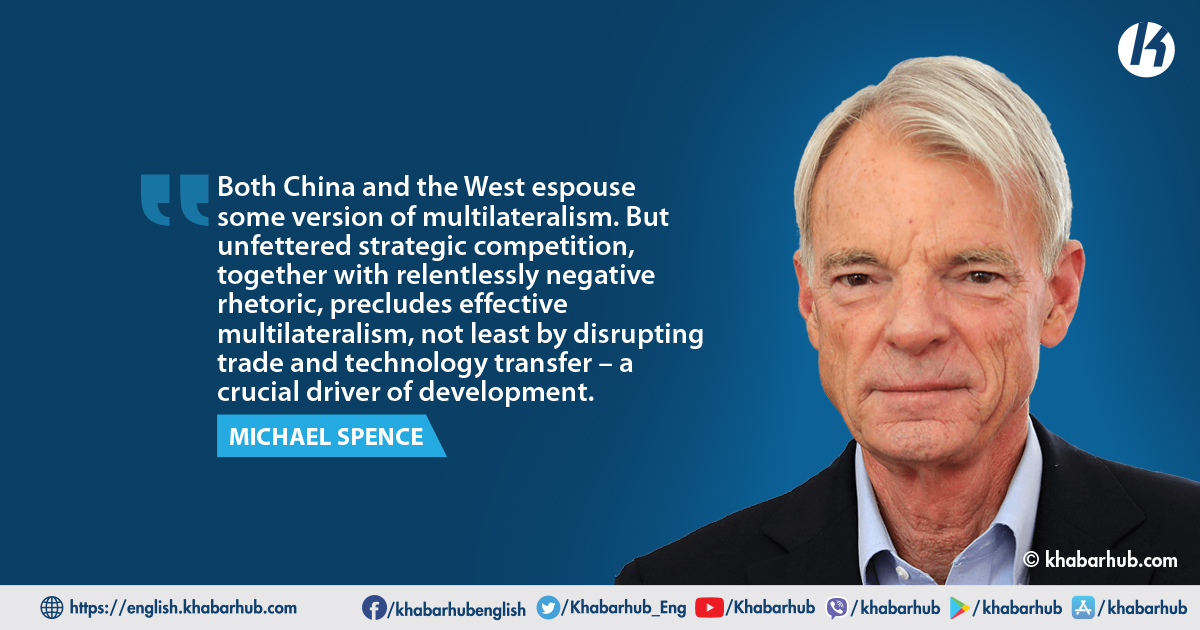At the recent G7 and NATO gatherings, China was singled out as a strategic competitor, a calculating trading partner, a technological and national-security threat, a human-rights violator, and a champion of authoritarianism globally.
China denounced these characterizations, which its embassy in the United Kingdom called “lies, rumors, and baseless accusations.” The risks that such rhetoric poses should not be underestimated.
Many in the West disapprove of China’s single-party governance structure, just as vocal elements in China disparage Western liberal democracy, which they argue is in terminal decline.
The real danger, however, is that officials on both sides seem to have embraced a zero-sum framework, according to which the two sides cannot simply co-exist; one side must “win.”
By this logic, both sides must always be trying to crush the competition. So, for China, the West – especially the United States – must be seeking to reverse its rise (which, in reality, was facilitated in no small part by the US).
Strategic competition is a different story. After all, there are powerful dual-use technologies – often emerging from non-defense sectors – that advance both economic and national-security objectives. Leaders should not pretend this is not the case.
And, for the West, China is determined to leverage its economic might, including its huge internal market, to reshape the global system in its image and to its benefit.
The more often leaders repeat these narratives, the more likely ordinary citizens are to become convinced that they are true. Rising fear and resentment on both sides increases the risk that the narratives will become self-fulfilling prophecies.
In the meantime, the focus on bilateral competition obscures the needs and interests of people in emerging markets and developing economies.
Yes, China and the West espouse some version of multilateralism. But unfettered strategic competition precludes effective multilateralism, not least by disrupting trade and technology transfer – a crucial driver of development.
China and the West urgently need a new framework for understanding the state of the world and their place in it. Such a framework must recognize, first and foremost, that properly regulated economic competition is not a zero-sum game.
In static terms, normal economic competition bolsters price efficiency and helps to align supply and demand. In dynamic terms, it leads to what Joseph Schumpeter dubbed “creative destruction” – a powerful mechanism for translating knowledge, ideas, and experiments into new products, services, and cost-reducing processes. In other words, it leads to advances in human well-being.
Both democracies and single-party systems have produced good and bad development outcomes. It seems that the most important precondition for development is leaders’ commitment to an inclusive vision of human well-being.
There is no reason to think that cross-border competition cannot produce the same benefits. On the contrary, experience shows that it can, so long as supporting legal and regulatory structures are in place and the playing field is level.
Admittedly, delivering these conditions – especially a level playing field – is difficult on an international scale, but that doesn’t mean it can’t be done.
Strategic competition is a different story. After all, there are powerful dual-use technologies – often emerging from non-defense sectors – that advance both economic and national-security objectives. Leaders should not pretend this is not the case.
But that, too, does not mean countries are condemned to play a zero-sum game, focused on making (or keeping) others weak. Instead, China and the West should agree to achieve and preserve a degree of economic, technological, and defense parity.
This means abandoning efforts to block the diffusion of knowledge and technology – an enterprise that is rarely effective in the long run.
Such an approach would avoid greater fragmentation of the global economic system, which is particularly damaging to third parties.
And it would deter offensive use of military or technological capabilities – vital in an environment where neither side trusts the other.
But a system that minimizes the need for trust does not justify mutual villainization. There is nothing wrong with preferring the governance system in one’s own country, including its particular balance of individual rights and collective interests.
Economic, technological, and military competition is inevitable. The question is whether it will be constructive. As it stands, the world is moving toward an equilibrium in which it will not be, with third parties, or “non-protagonists,” suffering the most.
Such preferences are based on factors like personal experience, education, and values, not objective fact. There is no clear evidence that one particular system of governance guarantees economic and social development.
Both democracies and single-party systems have produced good and bad development outcomes. It seems that the most important precondition for development is leaders’ commitment to an inclusive vision of human well-being.
When we assume that our own preferred system is objectively superior, and demonize alternatives, we end up mis-framing the terms and likely outcomes of economic and strategic competition. Worse, competition over governance distracts from more productive dimensions of interdependence.
Economic, technological, and military competition is inevitable. The question is whether it will be constructive. As it stands, the world is moving toward an equilibrium in which it will not be, with third parties, or “non-protagonists,” suffering the most.
But it is not too late to change course. Given the lack of information and trust, together with internal political dynamics, doing so will take considerable courage from leaders on both sides. The first step is for both sides to renounce the kind of provocative rhetoric we have seen in recent weeks.
(Michael Spence, a Nobel laureate in economics, is Professor of Economics Emeritus and a former dean of the Graduate School of Business at Stanford University)
Copyright: Project Syndicate









Comment